2017年秋九年级英语全册Unit13We’retryingtosavetheearth(第6课时)作业课件(新版)人教新目标版
近年九年级英语全册 Unit 13 We’re trying to save the earth

(贵阳专版)2017九年级英语全册Unit 13 We’re trying to save the earth Period 4导学案(新版)人教新目标版编辑整理:尊敬的读者朋友们:这里是精品文档编辑中心,本文档内容是由我和我的同事精心编辑整理后发布的,发布之前我们对文中内容进行仔细校对,但是难免会有疏漏的地方,但是任然希望((贵阳专版)2017九年级英语全册Unit 13 We’re trying to save the earth Period 4导学案(新版)人教新目标版)的内容能够给您的工作和学习带来便利。
同时也真诚的希望收到您的建议和反馈,这将是我们进步的源泉,前进的动力。
本文可编辑可修改,如果觉得对您有帮助请收藏以便随时查阅,最后祝您生活愉快业绩进步,以下为(贵阳专版)2017九年级英语全册Unit 13 We’re trying to save the earth Period 4导学案(新版)人教新目标版的全部内容。
Unit13 We're trying to save the earth!period 4 SectionB 2c—selfcheck【教学目标】知识与技能(1)熟练掌握下列词汇:(2)熟练掌握下列短语:1.________________ 以…而闻名2. ___________…____________…不仅…而且3。
___________________有一个好的环境4. ______________________ 有待提高(改善)5。
______________________ 变得越来越严重(3)掌握下列句型:1。
The river _______________________ 这条河以前是如此的清澈.2. We _______________________ in the environment. 我看到许多环境的变化。
3. People ___________________________ more。
人教版英语九年级全册 Unit 13 We're trying to save the
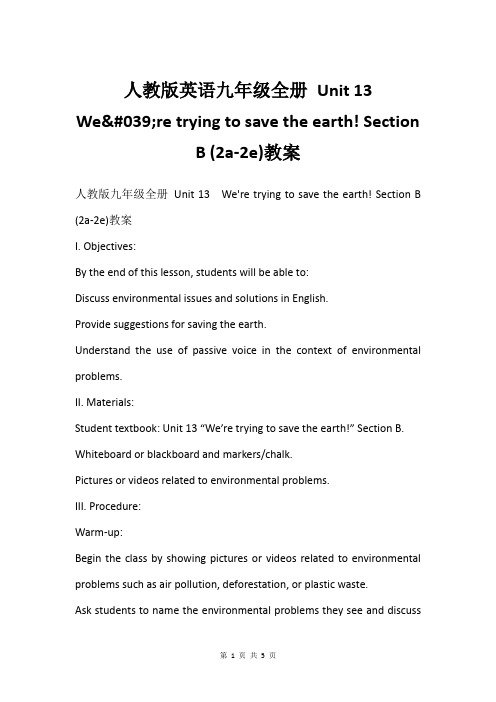
人教版英语九年级全册Unit 13We're trying to save the earth! SectionB (2a-2e)教案人教版九年级全册Unit 13 We're trying to save the earth! Section B (2a-2e)教案I. Objectives:By the end of this lesson, students will be able to:Discuss environmental issues and solutions in English.Provide suggestions for saving the earth.Understand the use of passive voice in the context of environmental problems.II. Materials:Student textbook: Unit 13 “We’re trying to save the earth!” Section B. Whiteboard or blackboard and markers/chalk.Pictures or videos related to environmental problems.III. Procedure:Warm-up:Begin the class by showing pictures or videos related to environmental problems such as air pollution, deforestation, or plastic waste.Ask students to name the environmental problems they see and discusstheir causes and potential solutions as a class.Presentation:Introduce the topic of the lesson: environmental problems and solutions. Review the vocabulary related to the environment and add any necessary new vocabulary on the board.Discuss the use of passive voice in talking about environmental issues. Practice: (15 minutes)a. Activity 1: Vocabulary ReviewHave students work in pairs or small groups to match the vocabulary words with their definitions or examples. Use flashcards or a worksheet for this activity.b. Activity 2: Group DiscussionDivide the class into groups of four or five.Provide each group with a list of environmental problems (air pollution, water pollution, deforestation, etc.).Ask each group to discuss the causes and effects of the assigned problem and brainstorm possible solutions.Encourage students to use the passive voice when discussing the problems and solutions.Production:Hand out Worksheet 2a from the textbook to each student.Instruct students to complete the sentences using the correct passiveforms of the verbs in brackets.Allow students to work individually or in pairs to complete the task. Review the answers as a class and provide feedback.Consolidation:Conduct a class discussion and ask students to share their suggestions on how they can contribute to saving the earth.Encourage students to provide specific actions they can take individually or as a group.Summarize the key points discussed in the class and emphasize the importance of everyone’s efforts in saving the earth.Wrap-up:Assign Homework: Ask students to write a short paragraph about one environmental problem they are most concerned about and one solution they suggest.Recap the main points of the lesson and remind students to complete their homework.Assessment:Assess students based on their participation in group discussions, completion of the worksheet, and the quality of their homework assignment.Role Play:Divide the class into pairs or small groups.Assign each group a scenario related to an environmental problem (e.g., a discussion between a factory owner and an environmentalist, or a debate between two friends about the use of single-use plastics). Instruct students to prepare and perform a role play based on their assigned scenario.Encourage students to use the passive voice and express different perspectives on the issue.Research Project:Assign each student or group a specific environmental problem to research.Instruct students to gather information, statistics, and examples related to the problem.Ask students to create a presentation or poster to share their findings with the class.Provide time for students to present their research and discuss possible solutions.Writing Task:Ask students to write a persuasive letter to a local government official, addressing an environmental problem in their community.Instruct students to explain the issue, its impact, and propose specific actions or policies that can help solve the problem.Encourage students to use persuasive language and provide evidence tosupport their arguments.Homework:Review the vocabulary words related to the environment.Research and write a short essay on one global environmental issue, its causes, and its potential impact on the world. Includesuggestions for how individuals and governments can address the issue.。
九年级英语全册Unit13We'retryingtosavetheearthTheFirstPeri
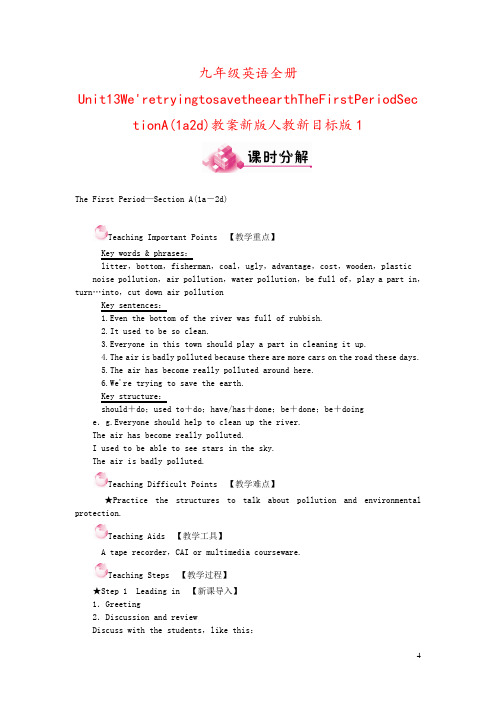
九年级英语全册Unit13We'retryingtosavetheearthTheFirstPeriodSec tionA(1a2d)教案新版人教新目标版1The First Period—Section A(1a-2d)Teaching Important Points 【教学重点】Key words & phrases:litter,bottom,fisherman,coal,ugly,advantage,cost,wooden,plastic noise pollution,air pollution,water pollution,be full of,play a part in,turn…into,cut down air pollutionKey sentences:1.Even the bottom of the river was full of rubbish.2.It used to be so clean.3.Everyone in this town should play a part in cleaning it up.4.The air is badly polluted because there are more cars on the road these days.5.The air has become really polluted around here.6.We're trying to save the earth.Key structure:should+do;used to+do;have/has+done;be+done;be+doing e.g.Everyone should help to clean up the river.The air has become really polluted.I used to be able to see stars in the sky.The air is badly polluted.Teaching Difficult Points 【教学难点】★Practice the structures to talk about pollution and environmental protection.Teaching Aids 【教学工具】A tape recorder,CAI or multimedia courseware.Teaching Steps 【教学过程】★Step 1 Leading in 【新课导入】1.Greeting2.Discussion and reviewDiscuss with the students,like this:T:What kinds of pollution are there these days?S:…T:What causes the pollution?S:…3.Review the words and expressions about the topic.★Step 2 Cooperative inquiry 【合作探究】1.Finish the task in 1a①Show pictures or play videos about pollution and talk about the pollution.②Read these phrases in 1a.Look at the pictures in 1a and say what they see in the pictures.Write down the words and add more words.③Ask students to say out their words in each kind of pollution.2.Finish the task in 1b①Read the instructions.Get the students to read the contents in the chart and think of what they will fill in the blanks.②Play the recording for the first time.Students listen and fill in the words.③Play the recording a second time.Ask them to check the answers.Then ask the questions.Students answer with full sentences.④Ask more questions to help students learn more details.Then play the recording for the students to role-pay the conversation.3.Finish the task in 1c①Show the key words of the conversation.Ask students to retell the contents in the chart.Like this:What:dirty;bottom,rubbish;fishWhy:littering,putting wasteHow:write to,close down;help to clean up②Read aloud the model dialogue in 1c.Then in pairs,do the oral practice with more words.③Ask two pairs to perform in class.4.Finish the tasks in 2a-2b①Use PPT or pictures to show the four kinds of pollution.Get the groups of students to have a competition to say words about the pollution one by one.land pollution:…air pollution:…noise pollution:…water pollution:…②Get the students to write down these words in their notebooks.③Play the recording for the first time.Students listen and circle the kinds of pollution.Check answers with the class.④Read the sentences in 2b.Predict the contents they will fill in.Play the recording.Students listen and complete the sentences.⑤Play the recording again.Check the answers with the whole class.5.Finish the task in 2c①Read the sample conversation in 2c.Then Read the listening materials and discuss in pairs what causes the two kinds of pollution.②Students work in pairs,making dialogues.③Ask three pairs to role-play their conversations to the class.6.Finish the task in 2d①Talk about the picture in 2d.Ask:What are your ideas for solving the air pollution/waste pollution problem?Present the new words in the conversation.Such as,coal,advantage,wooden,plastic,takeaway,bin,…②Read the conversation in 2d quickly.Find out the problems about environmental pollution in the dialogue.③Read the conversation again.Ask the students to find the ways to solve the problems of air and waste pollution.④Read aloud the conversation by the recording.⑤Learn the useful expressions:What are your ideas for doing…To cut down air pollution,we should…So together,our actions can make a difference and…⑥Role-play or read the conversation in pairs until fluently.★Step 3 Homework1.What are your ideas for solving the waste pollution problem?2.Write the words about the four kinds of pollution.3.Translate the following sentences into English.(1)我们正在想办法拯救地球。
人教版九年级全一册英语Unit-13-We’re-trying-to-save-the-earth-教案
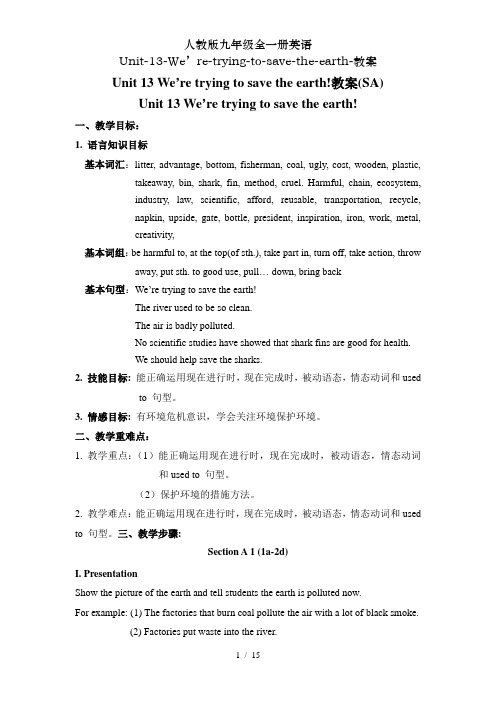
Unit 13 We’re trying to save the earth!教案(SA)Unit 13 We’re trying to save the earth!一、教学目标:1. 语言知识目标基本词汇:litter, advantage, bottom, fisherman, coal, ugly, cost, wooden, plastic, takeaway, bin, shark, fin, method, cruel. Harmful, chain, ecosystem,industry, law, scientific, afford, reusable, transportation, recycle,napkin, upside, gate, bottle, president, inspiration, iron, work, metal,creativity,基本词组:be harmful to, at the top(of sth.), take part in, turn off, take action, throw away, put sth. to good use, pull… down, bring back基本句型:We’re trying to save the earth!The river used to be so clean.The air is badly polluted.No scientific studies have showed that shark fins are good for health.We should help save the sharks.2. 技能目标: 能正确运用现在进行时,现在完成时,被动语态,情态动词和usedto 句型。
3. 情感目标:有环境危机意识,学会关注环境保护环境。
二、教学重难点:1. 教学重点:(1)能正确运用现在进行时,现在完成时,被动语态,情态动词和used to 句型。
人教版英语九年级全册Unit13We’retryingtosavetheearth!大单元教学设计
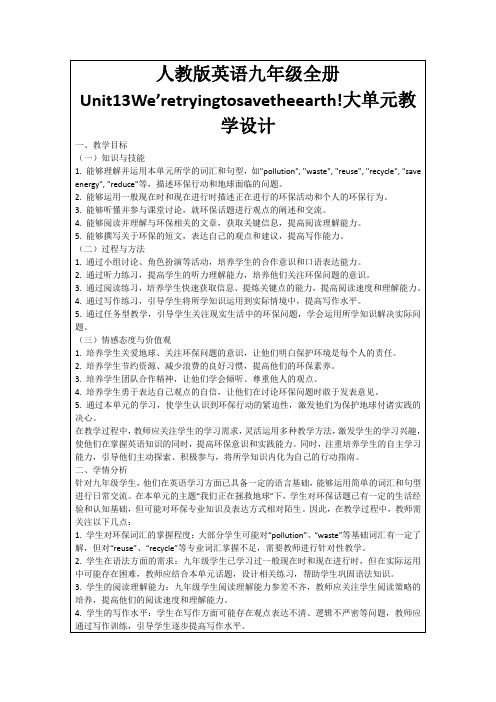
3.通过讨论,教师引入本单元的主题:“We’re trying to save the earth!”(我们正在尝试拯救地球),并简要介绍本节课的学习目标。
6.拓展延伸:鼓励学生在课后进行环保主题的研究,如调查身边的环保行为、采访环保人士等,将学习延伸到课堂之外。
四、教学内容与过程
(一)导入新课
在这一阶段,教师将采用多媒体资源和生活实例来导入新课,激发学生的学习兴趣和参与热情。
1.教师展示一系列关于地球环境问题的图片和视频,如森林砍伐、海洋污染、空气污染等,引导学生关注这些问题的严重性。
教学设想:通过词汇卡片、小组竞赛、情景剧等形式,让学生在实际语境中反复练习,加深记忆。
2.语法运用:现在进行时在描述正在进行的环保活动中的应用,以及一般现在时在陈述环保事实和习惯中的应用。
教学设想:设计语法练习,如填空、改错、句型转换等,帮助学生掌握语法规则,并通过真实的语境任务进行巩固。
3.阅读理解:提取文章主旨,理解作者观点,分析环保问题的原因和解决方案。
4.写作任务:请学生撰写一篇关于“我如何为地球环境保护做贡献”的短文,要求他们运用课堂所学的写作技巧,表达自己的观点和建议。
5.环保实践:鼓励学生在家中或学校进行一项环保实践活动,如回收废旧物品、节约用水用电等,并记录下来,在下一节课与同学分享。
6.家庭作业:布置一份综合性的家庭作业,结合本单元所学内容,要求学生观察并记录身边的环保行为,采访家人或朋友对环保的看法,整理成一篇小报告。
在教学过程中,教师应充分了解学生的学情,结合他们的需求和兴趣,设计有针对性的教学活动,激发学生的学习兴趣,提高他们的英语素养和环保意识。
2017-2018学年九年级英语全册 Unit 13 We’re trying to save th
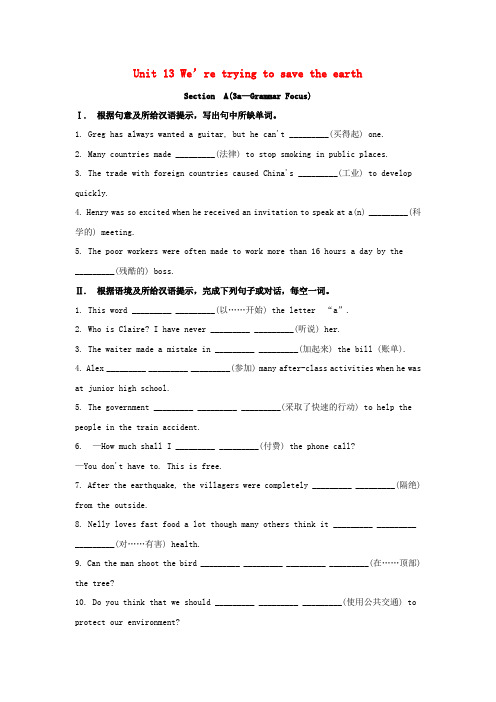
Unit 13 We’re trying to save the earthSection A(3a—Grammar Focus)Ⅰ.根据句意及所给汉语提示,写出句中所缺单词。
1. Greg has always wanted a guitar, but he can't _________(买得起) one.2. Many countries made _________(法律) to stop smoking in public places.3. The trade with foreign countries caused China's _________(工业) to develop quickly.4. Henry was so excited when he received an invitation to speak at a(n) _________(科学的) meeting.5. The poor workers were often made to work more than 16 hours a day by the_________(残酷的) boss.Ⅱ. 根据语境及所给汉语提示,完成下列句子或对话,每空一词。
1. This word _________ _________(以……开始) the letter “a”.2. Who is Claire? I have never _________ _________(听说) her.3. The waiter made a mistake in _________ _________(加起来) the bill (账单).4. Alex _________ _________ _________(参加) many after-class activities when he was at junior high school.5. The government _________ _________ _________(采取了快速的行动) to help the people in the train accident.6. —How much shall I _________ _________(付费) the phone call?—You don't have to. This is free.7. After the earthquake, the villagers were completely _________ _________(隔绝) from the outside.8. Nelly loves fast food a lot though many others think it _________ _________ _________(对……有害) health.9. Can the man shoot the bird _________ _________ _________ _________(在……顶部) the tree?10. Do you think that we should _________ _________ _________(使用公共交通) to protect our environment?Ⅲ.根据短文内容及括号内所给(短语)动词的提示,用正确的时态或语态补全短文,使短文完整、通顺。
2017-2018学年九年级英语全册 Unit 13 We’re trying to save th
Unit 13 We’re trying to save the earthSection A(1a—2d)Ⅰ.根据句意及所给首字母提示,补全句中所缺单词。
1. C can be used to produce electricity.2. The new car c a lot of money, but it was certainly worth it.3. There is a w bed, a table and two chairs in this small room.4. It is a very clean city. You will hardlyfind l when you walk along the street.5. My uncle is a great f and he caught four fish this morning.6. Some cups in the shop are nice and expensive and the othersare u and cheap.7. Living in this street has a lot of a . The only drawback (弊端) is noise.Ⅱ.根据句意,从方框中选择恰当的短语填空,有的需要变换形式。
1. What a mess! You should ____________ your room now.2. Every farmer knows that weather ____________ farming.3. As we all know, smoking too much can ____________ cancer and many other illnesses.4. He said he would ____________ us when he left home but we haven't heard from him so far.5. The manager asked me to ____________ the report, because he didn't want to speak too long at the meeting.Ⅲ.根据汉语意思完成英语句子,每空一词。
人教版英语九年级全册unit13We’retryingtosavetheearth
设计意图:通过图片展示,让学生直观地感受到环境问题的严重性,为新课的学习做好情感铺垫。
2.教学活动:教师引导学生讨论以下问题:What do you see in these pictures? How do you feel about it? Do you think it's important to protect the environment?
2.培养学生的团队合作精神,使他们学会在合作中共同解决问题。
3.增强学生的社会责任感,让他们明白学习英语的目的之一是为了更好地参与国际交流,为全球环保事业做出贡献。
4.激发学生对英语学习的兴趣,帮助他们树立自信心,勇于面对挑战。
二、学情分析
针对人教版英语九年级全册Unit 13 “We’re trying to save the earth”的教学内容,学情分析如下:
人教版英语九年级全册unit13We’retryingtosavet
在本章节中,我们将围绕人教版英语九年级全册Unit 13 “We’re trying to save the earth”的主题,帮助学生掌握以下知识与技能:
1.掌握本单元的核心词汇和短语,如“pollution”, “waste”, “recycle”, “renewable energy”等,并能运用到日常交流中。
设计意图:激发学生的创作兴趣,提高他们的审美和动手能力。
设计意图:锻炼学生的书面表达能力,使他们能够运用所学知识阐述自己的观点。
2.口语作业:学生以小组为单位,录制一段关于环保的对话或访谈,讨论如何在学校或家庭中实施环保措施。要求每个成员都有发言机会,对话中需包含本节课所学的词汇和时态。
人教版英语九年级Unit13《We’retryingtosavetheearth》全单元说课稿
人教版英语九年级Unit 13《We’re trying to save the earth》全单元说课稿一. 教材分析人教版英语九年级Unit 13《We’re trying to save the earth》全单元主要围绕环保主题展开,通过学习本单元,学生能够掌握与环保相关的词汇和表达方式,了解人们为保护地球所采取的行动,提高环保意识。
本单元包括两个阅读文本,分别是关于地球一小时活动和一位美国学生的环保故事。
通过阅读和实践活动,学生能够提高阅读理解能力,培养运用英语进行交流的能力。
二. 学情分析九年级的学生已经具备了一定的英语基础,能够理解和运用一些基本的英语表达。
但他们在阅读理解,尤其是对于长篇阅读材料的理解上还存在一定的困难。
此外,学生对于环保主题的认识和关注程度不同,因此在教学过程中需要引导学生深入思考,提高他们的环保意识。
三. 说教学目标1.知识目标:学生能够掌握本单元的重点词汇和表达方式,理解阅读文本的内容。
2.能力目标:学生能够运用英语进行阅读理解,提高阅读能力;能够运用所学知识进行交流和讨论。
3.情感目标:学生能够增强环保意识,认识到保护地球的重要性。
四. 说教学重难点1.重点:本单元的重点是让学生掌握与环保相关的词汇和表达方式,提高阅读理解能力。
2.难点:学生对于阅读文本的理解和运用所学知识进行交流和讨论。
五. 说教学方法与手段1.教学方法:采用任务型教学法,引导学生通过阅读、讨论、实践活动等方式,提高英语运用能力。
2.教学手段:利用多媒体教学设备,展示相关图片和视频,帮助学生更好地理解文本内容。
六. 说教学过程1.导入:通过展示地球环境的图片,引导学生思考环保问题,激发学生的学习兴趣。
2.阅读理解:学生自主阅读文本,回答相关问题,教师进行讲解和指导。
3.小组讨论:学生分组讨论,分享各自的观点和感受,教师进行巡回指导。
4.实践活动:学生根据所学内容,进行角色扮演或写作练习,教师进行评价和指导。
人教版九年级英语全册Unit 13 We’re trying to save the earth
Exercises
●2. John played an important
part __B_____ the plan.
● A. made B. in making C. to make D. makes
Exercises
●3. — Wow, your sweater is very beautiful! How much is it?
Exercises
●5. What a nice day! We should go
sightseeing _B______ watching TV in the
hotel.
●A. because of
B. instead of
●C. together with
D. out of
Homework
loud music cars rubbish planes littering乱丢垃圾 ships factories smoking building houses mobile phones
污水
Write the words in the box below. Then add more words.
Unit 13 We’re trying to save the earth.
Section A 1a-1c
Learning objectives
● 1.To talk about different kinds of pollution; ● 2.To learn to protect environment; ● 3.To master the key words and phrases:litter, bottom, fisherman,
